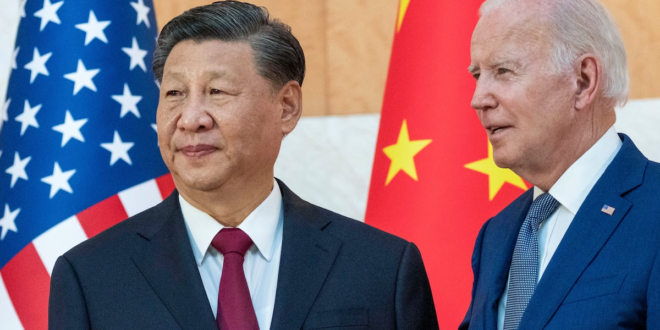As the Biden administration and Congress struggle to get their heads around the challenge posed by China today, they should reflect on lessons learned in America’s success in winning the Cold War with the Soviet Union. Just because fundamental and irresolvable differences in values and interests compel the United States and China to be formidable rivals does not mean a hot war is a viable option.
Both the United States and China have nuclear arsenals capable of decimating each other in war. Yet neither one could launch such an attack without triggering a retaliatory response that would also destroy itself. The countries must therefore cooperate to prevent incidents or accidents dragging them into war.
Moreover, on a small planet in which either nation’s greenhouse gas production could make life unlivable for everyone, the two major emitters must find ways to work together to constrain emissions. Entangled in a global financial system that produces such extraordinary benefits to citizens that any government that tried to decouple from it would soon find itself out of power, they have no alternative but to manage risks in ways that sustain these benefits.
Can two great powers competing for supremacy simultaneously cooperate in building a safer world?
It has happened before. John F. Kennedy, whose 1961 inaugural address pledged to “pay any price, bear any burden … to assure the survival and the success of liberty,” was a dedicated cold warrior. Two and a half years later, in the most important foreign policy address of his career — delivered 60 years ago last week — he pivoted somewhat and declared that for the decades ahead the U.S. priority in relations with Moscow should be to “help make the world safe for diversity.”
What did that mean? Seared by the Cuban missile crisis of 1962, Kennedy understood that America’s strategy toward its deadliest adversary had to change. While he never wavered in his core commitment to a strategy of containment that sought to prevent Soviet expansion, he nonetheless argued that the United States should now live and let live in a world of diverse political systems with diametrically opposed values and ideologies. Going forward, the rivals would compete vigorously — but only peacefully — to demonstrate whose values and system of governance could best meet the needs of its citizens.
To survive, the two superpowers would have to find ways to constrain their competition, compromise and even cooperate. These efforts began with a hotline between the White House and the Kremlin to allow direct, immediate communication, as well as a unilateral moratorium on atmospheric tests of nuclear weapons. Negotiations then produced the 1963 Limited Test Ban Treaty prohibiting all atmospheric nuclear weapons tests, arms-control agreements that placed caps on U.S. and Soviet arms, and the 1968 Nuclear Nonproliferation Treaty that over the decades since has limited the number of new nuclear weapons states. Together, these steps created a framework for crisis management that helped make the Cold War survivable.
U.S.-China relations have now deteriorated to their worst state since they were formally established about a half-century ago. The first step in stabilizing relations is “getting back to Bali” — reviving the high-level dialogue established between President Biden and Chinese President Xi Jinping at the Group of 20 summit in Bali last November. At that meeting, the two leaders made a list of actions they could jointly take — in areas such as climate change, public health, agriculture and food security — to reverse this downward trend. Those plans were interrupted when a Chinese spy balloon was discovered over the United States about a week before Secretary of State Antony Blinken was scheduled to visit Beijing; that visit might now take place as early as sometime this week or next.
Biden and Xi recognize that war between the two nations would be suicidal for both. They understand that the most dangerous flash point is Taiwan. While the nations’ differences over Taiwan are irreconcilable, irreconcilable does not mean unmanageable. To start, both sides should reiterate the principles they have already agreed to in the three U.S.-China Joint Communiques that have allowed citizens on both sides of the Taiwan Strait to see greater increases in their incomes, health and well-being than in any equivalent period in their long histories.
Living with what JFK called “diversity” did not require retreating from ruthless competition with a regime whose values and interests were antithetical to our own. But it did require faith in ourselves in the long game. As George Kennan, the author of the doctrine of containment, had argued presciently, the contradictions inherent in Soviet Communism’s command-and-control society would — with a bit of help from us — hollow out the Soviet Union. That is indeed what happened in 1991 when the Soviet Union collapsed. On the territory of what had been the most expansive empire in the world, there emerged Russia and 14 other newly independent states — one of which was Ukraine.
Much like the United States and the Soviet Union, the United States and China are condemned to compete and to cooperate. Can Biden and Xi find a way to build a world safe enough to allow the competition between America’s liberty-centered democracy and another nation’s party-led autocracy to continue peacefully for long enough for one to triumph? It has happened before.
 Eurasia Press & News
Eurasia Press & News



